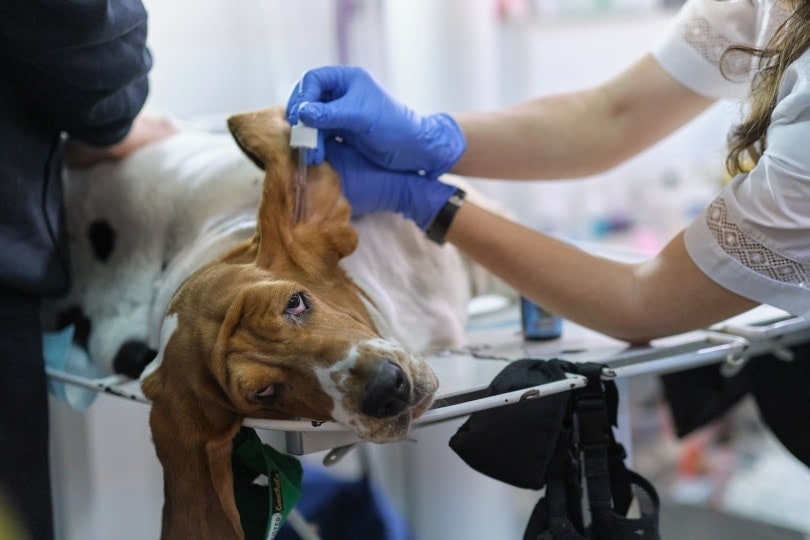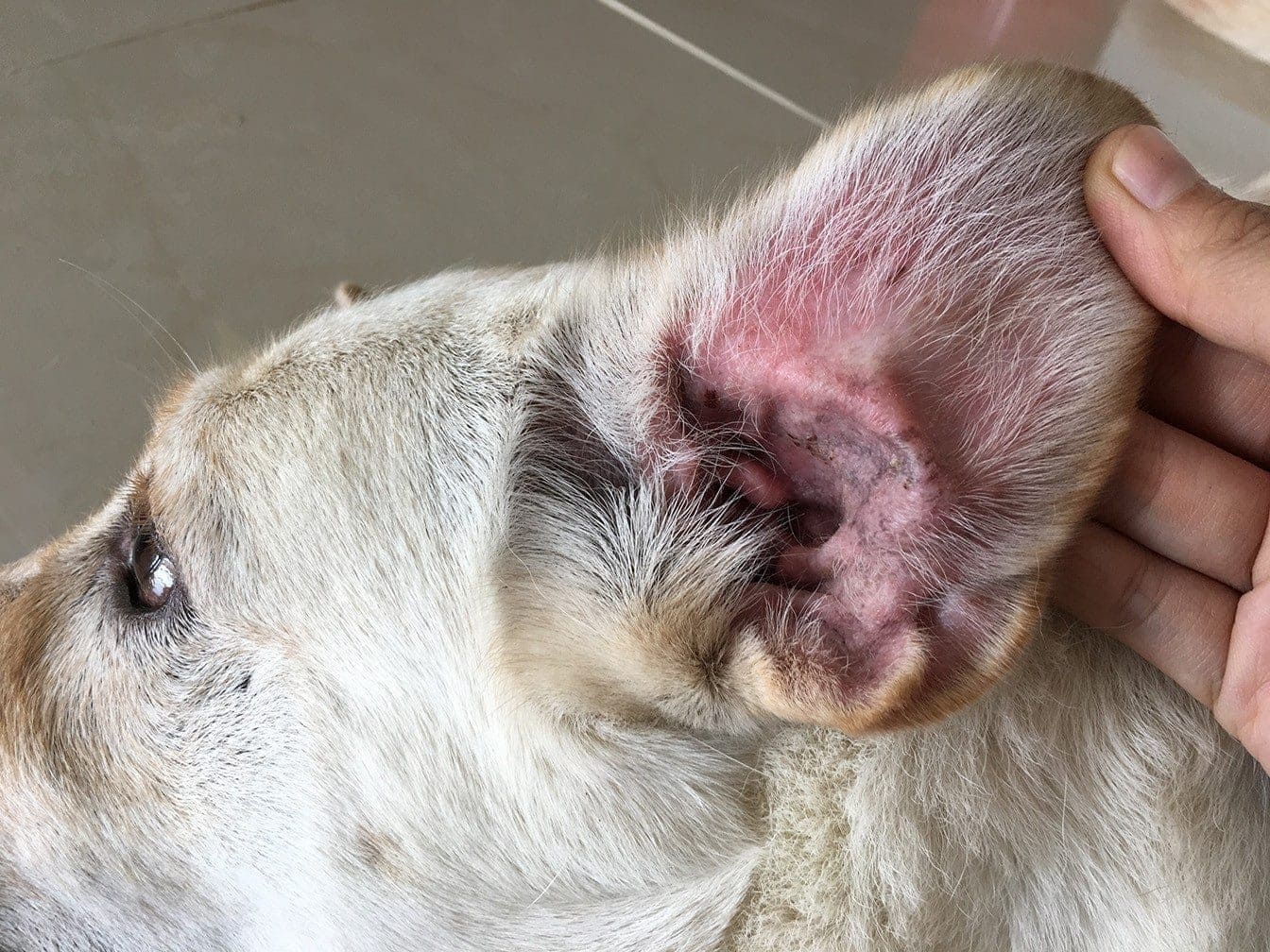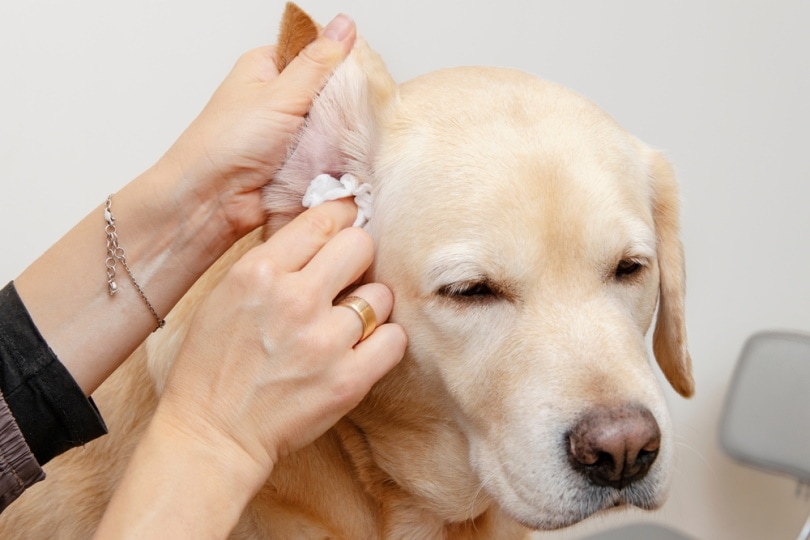Can Ingredients in Dog Food Cause Ear Infections? Vet-Approved Facts & Care
Updated on

Humans with allergies can often suffer from recurring ear infections. Ear infections are painful and a real nuisance, but did you know that dogs can suffer from ear infections, too? Some dogs may never have one, but if your dog is constantly getting them, it’s vital to find the culprit that’s causing them. Some dogs have food allergies that are usually from a protein source in their diet. Because of this, ingredients in dog food can most certainly cause ear infections in dogs.
In this article, we’ll explore what to look for in dog foods and how to determine the possible cause of your dog’s ear infection.
What Exactly Are Ear Infections?
Ear infections are caused by allergy triggers and are quite common. What causes them is an overgrowth of bacteria or yeast inside the ear, resulting in inflammation. There are three types1 of ear infections: otitis externa, media, and interna. Otitis externa is the most common, which affects the exterior portion of the ear canal. Otitis interna and media affect the inner and middle parts of the ear, respectively.
If not treated, otitis media and interna can be serious and cause deafness, vestibular signs, and facial paralysis. This is why it’s important to know what ear infections look like so that you can start treatment as soon as possible.

What Does an Ear Infection on a Dog Look Like?
Symptoms of ear infections in dogs are not too difficult to point out. Some common signs that your dog may have an ear infection are as follows:
- Head tilt
- Excessive scratching of the ear
- Redness/irritation
- Foul odor
- Discharge
- Crust or scabs in the ear
- Pain
If you notice any of these symptoms in your dog, you should take them to your veterinarian immediately for an assessment. You may be able to see for yourself if your dog has an ear infection by the telltale signs mentioned above, but your vet can be able to identify the location of the infection with help of an otoscope or advanced imaging.
What Types of Ingredients in Dog Food Trigger Allergies?
As we’ve stated, certain ingredients in dog food can trigger food allergies, which in turn can lead to recurrent ear infections. Eliminating the triggering allergen is crucial in keeping your dog happy and healthy.
The most common culprit that triggers food allergies in commercial dog food is the protein source. Chicken is a common allergy trigger in dogs, along with dairy, gluten, eggs, beef, and soy. These ingredients are not the only ones that can trigger allergies, as additives and other preservatives can cause symptoms, too.
Gluten intolerance usually causes additional symptoms, such as vomiting, diarrhea, gas, loose stool, and mucus in the stool. Gluten intolerance can also cause itchy skin. Sometimes it takes trial and error to determine exactly what your dog may be allergic to in its food, but with patience, you should be able to decipher the problem and eliminate it from your dog’s diet.

How Can I Treat My Dog’s Ear Infection at Home?
First and foremost, a trip to the vet is warranted if your dog is displaying ear infection symptoms. Depending on the cause, your vet may prescribe antibiotics to knock it out, especially if it’s in the inner ear. Remember that certain ear infections can be serious and cause serious health risks, such as deafness, facial paralysis, or vestibular conditions. Because of these possibilities, we cannot recommend treating the issue alone at home.
Conclusion
Now that you know certain ingredients in your dog’s food can cause ear infections, it’s important to monitor your dog after eating to see if any unpleasant symptoms develop. Your veterinarian can assist you in finding the triggers, and it’s not a task we recommend doing on your own.
Stay vigilant and stay the course. In time, you’ll find the trigger, and once you know what to avoid in dog food, your dog can say bye-bye to ear infections.
Featured Image Credit: Yavdat, Shutterstock














